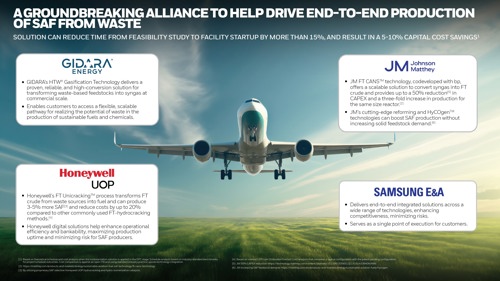Honeywell, Johnson Matthey, Gidara Energy and Samsung E&A form SAF technology alliance
Honeywell, Johnson Matthey, GIDARA Energy and SAMSUNG E&A announced the formation of a strategic technology alliance to bring a groundbreaking end-to-end global solution to market for producing sustainable aviation fuel (SAF) from biomass and municipal solid waste. The alliance brings together a wealth of diverse expertise and capabilities to help customers streamline the entire SAF production chain—from feedstock to final product.
By collaborating, the companies plan to introduce a new joint technology offering that leverages the Fischer-Tropsch (FT) production process and aims to unlock abundant, globally available feedstock options to help meet the growing demand for SAF and support energy security. The joint approach aims to expedite project timelines and provide customers with a single point of accountability for project execution and product guarantees, ensuring communication, coordination and reliability throughout the SAF production process.
With the resources of all four companies, the integrated and modular solution is expected to reduce the time between feasibility study and facility startup by more than 15% and can reduce capital expenditures by up to 10%.1
The innovative solution the technology alliance plans to bring to market is a non-exclusive offering designed for customers wanting a full-service delivery including:
· GIDARA Energy’s proficiency in gasification and syngas production for feedstock transformation.
· Johnson Matthey brings advanced catalysts and technology for syngas to fuels.
· Honeywell’s process technology and digital automation solutions.
· SAMSUNG E&A’s global expertise in engineering, procurement, construction and project execution management.

Over the near-term, the collaboration aims to scale the use of gasification and FT SAF production methods, while enabling biomass and municipal solid waste to be used as feedstocks. As the SAF industry faces limits of traditional feedstocks, this production method is becoming increasingly important with the International Energy Agency reporting that biofuels produced from waste and nonfood energy crops will meet more than 40% of total biofuel demand by 2030.2
Citations:
1 Based on theoretical schedule and cost analysis when the modularization solution is applied in the EPC stage. Schedule analysis based on industry standard benchmarks for project schedule outcomes. Cost comparison is against an open ITB and using standard industry practice upside technology integration.
2 https://www.iea.org/energy-system/low-emissions-fuels/biofuels#tracking






Comments